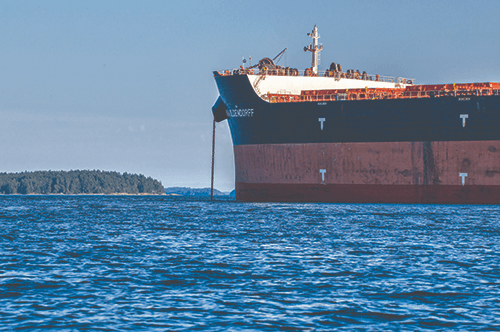The lack of synergy, coupled with private and agency interest that has been the bane of Nigeria’s security architecture, has been on display in the maritime sector in recent time. Nigerian maritime agencies including the Nigerian Navy have been in the news for the wrong reasons. They have been engaged in a silent confrontation, which blew open in the press a month ago, and has since snowballed into a battle that has shifted to the National Assembly.
At the centre of the controversy is a Secured Anchorage Area (SAA), which a private security firm, Ocean Marine Services Limited (OMSL) has been operating in the Lagos Pilotage District since 2014 in collaboration with the Nigerian Navy. Last October, the Nigerian Ports Authority (NPA) decided to stop the operators from continuing the operation of the so-called safe anchorage area, citing four major reasons for its action.
One of the reasons adduced by NPA is that it poses a threat to national security, and increases the cost incurred by ship owners in bringing their vessels to Nigerian ports. NPA further stated that an anchorage area is an integral part of its statutory responsibility and that the SAA operated by OMSL and the navy is located within the port limit, which should be strictly under the management and control of NPA.
Since the closure, the operators of the SAA have fought back to regain control of the money spinning facility. This has led to the emergence of a group hitherto unknown in the industry claiming to fight for the safety of ships in the Lagos waters. The battle has now shifted to the National Assembly as petitions and counter-petitions inundate the upper and lower legislative chambers. The Senate has since scheduled an investigative hearing on the matter beginning on the 26th of November 2019.
We seriously deplore some disclosures emanating from the closure of the safe anchorage area. According to NPA, the Nigeria Navy facilitated the operation of the area by collaborating with the United Kingdom Hydrographic Office (UKHO) to publish the SAA in its Admiralty Chart No. 1381 of Lagos ports, indicating that the anchorage being operated by NPA was ill-equipped, and thereby giving the impression that it was not secured. This has led NPA to amend the admiralty chart.
On its part, the Nigerian Maritime Administration and Safety Agency (NIMASA), published a Marine Notice on the existence of the SAA as an additional security service facility for the provision of dedicated 24/7 watch for vessels seeking extra protection while at the anchorage offshore Lagos.
The implications of the roles of NIMASA and the navy in the operation of the safe anchorage area close to the Lagos ports is that Federal Government agencies do not appear to know the limits of their statutory responsibilities. It also means that they do not know or do not respect the duties and responsibilities of sister agencies. Above all, it portrays lack of consultation, collaboration and coordination in matters of maritime security.
Truth be told, a private firm operating a security facility whether in collaboration with the navy or not for the past five years in Lagos, and making ship owners pay as much as $1,500 every day for at least 28 days after an initial payment of $2,500 does not speak well of the security situation of the Lagos anchorage area. It also adds significantly to the cost of doing business at the nation’s seaports. That NPA decided to end the “business” and take up the challenge of ensuring the safety of the entire Lagos anchorage, and reminding sister agencies of their responsibilities in this regard should not spark controversy or recriminations.
We expect that by the time the agencies appear before the Senate, sanity will prevail; every agency will admit its fault and failures, and a resolution will be reached to work for the security of Nigeria’s territorial waters and anchorages. As they meet, every agency should recognize its limits and responsibilities, and pledge to avoid encroaching on the functions of one another.
Above all, our public servants should endeavor to live up to expectations, and learn to put aside private or group interest in favour of national interest.
